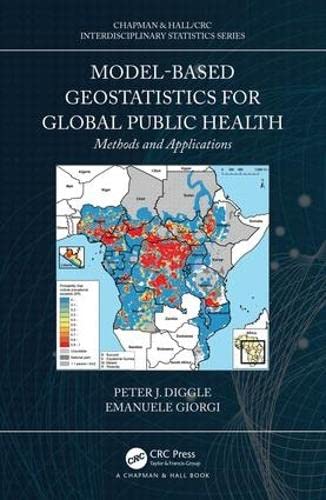-
 Thanh toán đa dạng, linh hoạtChuyển khoản ngân hàng, thanh toán tại nhà...
Thanh toán đa dạng, linh hoạtChuyển khoản ngân hàng, thanh toán tại nhà... -
 Miễn Phí vận chuyển 53 tỉnh thànhMiễn phí vận chuyển đối với đơn hàng trên 1 triệu
Miễn Phí vận chuyển 53 tỉnh thànhMiễn phí vận chuyển đối với đơn hàng trên 1 triệu -
 Yên Tâm mua sắmHoàn tiền trong vòng 7 ngày...
Yên Tâm mua sắmHoàn tiền trong vòng 7 ngày...
Model-based Geostatistics for Global Public Health: Methods and Applications (Chapman & Hall/CRC Interdisciplinary Statistics)
-

- Mã sản phẩm: 1138732354
- (2 nhận xét)

- Publisher:Chapman and Hall/CRC; 1st edition (March 11, 2019)
- Language:English
- Hardcover:248 pages
- ISBN-10:1138732354
- ISBN-13:978-1138732353
- Item Weight:1.34 pounds
- Dimensions:6.25 x 0.75 x 9.25 inches
- Best Sellers Rank:#4,345,483 in Books (See Top 100 in Books) #36 in Sudan Travel Guides #69 in Gambia & Senegal Travel Guides #391 in Geochemistry
- Customer Reviews:4.5 out of 5 stars 2Reviews

Tính năng sản phẩm
• Highlight, take notes, and search in the book• In this edition, page numbers are just like the physical editionMô tả sản phẩm
Product Description
Model-based Geostatistics for Global Public Health: Methods and Applications provides an introductory account of model-based geostatistics, its implementation in open-source software and its application in public health research. In the public health problems that are the focus of this book, the authors describe and explain the pattern of spatial variation in a health outcome or exposure measurement of interest. Model-based geostatistics uses explicit probability models and established principles of statistical inference to address questions of this kind.
Features:
- Presents state-of-the-art methods in model-based geostatistics.
- Discusses the application these methods some of the most challenging global public health problems including disease mapping, exposure mapping and environmental epidemiology.
- Describes exploratory methods for analysing geostatistical data, including: diagnostic checking of residuals standard linear and generalized linear models; variogram analysis; Gaussian process models and geostatistical design issues.
- Includes a range of more complex geostatistical problems where research is ongoing.
- All of the results in the book are reproducible using publicly available R code and data-sets, as well as a dedicated R package.
This book has been written to be accessible not only to statisticians but also to students and researchers in the public health sciences.
The Authors
Peter Diggle is Distinguished University Professor of Statistics in the Faculty of Health and Medicine, Lancaster University. He also holds honorary positions at the Johns Hopkins University School of Public Health, Columbia University International Research Institute for Climate and Society, and Yale University School of Public Health. His research involves the development of statistical methods for analyzing spatial and longitudinal data and their applications in the biomedical and health sciences.
Dr Emanuele Giorgi is a Lecturer in Biostatistics and member of the CHICAS research group at Lancaster University, where he formerly obtained a PhD in Statistics and Epidemiology in 2015. His research interests involve the development of novel geostatistical methods for disease mapping, with a special focus on malaria and other tropical diseases. In 2018, Dr Giorgi was awarded the Royal Statistical Society Research Prize "for outstanding published contribution at the interface of statistics and epidemiology." He is also the lead developer of PrevMap, an R package where all the methodology found in this book has been implemented.
Review
"This is an excellent source for public health professionals so far as the needed state-of-the-art concepts and methods that are needed to analyse and interpret geostatistical data. Basic knowledge of mathematical statistics is necessary to read through this well-written book... Focus has been made on disease mapping, environmental epidemiology, generalized linear models, variogram, and R-codes. The references are thorough and up-to-date. The examples are real-life oriented and interesting... Some unique features of this well-written book are the illustrations and they include river blindness in Liberia, heavy metal monitoring in Galicia, malnutrition in Ghana, rolling malaria in Malawi, ozone concentration in Eastern United States, prevalence and intensity of infection among others.This book is quite suitable to be a textbook for a graduate level course in global public health or geo-statistics. Researchers and doctoral graduate students seeking thesis topic ought to read this book. I enjoyed reading this book. I recommend this book to statistics and computing professionals."
- Ramalingam Shanmugam, in the Journal of Statistical Computation and Simulation, April 2020
"This book was written primarily to introduce geostatistics to public health researchers...The text goes beyond introductory descriptions and provides a fairly comprehensive guide to geostatistics, ranging from the design of geostatistical experiments to the analysis of complicated datasets. While the book’s target audience is mainly public health researchers, the material is also helpful to PhD students and even statistics faculty that want an introduction to geostatistics. Each chapter can be read as an independent guide or read jointly to gain a more complete understanding of geostatistical research from data collection to analysis... The text is well-written and genuinely enjoyable to read. One of the main attractions of the book is that the authors offer tidbits of advice from their own expert experience analyzing geostatistical data...While other texts can lose the readers in the seemingly endless modeling choices, Diggle and Giorgi guide their audience to make informed decisions from the first design stages to the final visualizations."
- Ian Laga and Xiaoyue Niu, JASA 2020
"The book provides an integrated mix of statistical theory and applications, working up from linear regression through to generalised geostatistical models and on to specialised topics, such as zero-inflation in geostatistical models, spatiotemporal models and approaches to combining data from multiple sources...The relevant case studies developed throughout the course of the book provide an excellent demonstration of the methods and potential insight available from using geostatistical approaches. Furthermore, the emphasis on the communication of model results is a beneficial addition for any statistician working in a collaborative environment. Model-based Geostatistics for Global Public Health provides a good grounding in geostatistical modelling with excellent worked case studies in the global public health domain. It offers particular value to applied statisticians with its technical detail and thorough case studies. The book is supported by an open-source R package, PrevMap."
- Kirsty L. Hassall, Rothamsted Research, Harpenden, UK
"This is an excellent source for public health professionals so far as the needed state-of-the-art concepts and methods that are needed to analyse and interpret geostatistical data. Basic knowledge of mathematical statistics is necessary to read through this well-written book... Focus has been made on disease mapping, environmental epidemiology, generalized linear models, variogram, and R-codes. The references are thorough and up-to-date. The examples are real-life oriented and interesting... Some unique features of this well-written book are the illustrations and they include river blindness in Liberia, heavy metal monitoring in Galicia, malnutrition in Ghana, rolling malaria in Malawi, ozone concentration in Eastern United States, prevalence and intensity of infection among others.This book is quite suitable to be a textbook for a graduate level course in global public health or geo-statistics. Researchers and doctoral graduate students seeking thesis topic ought to read this book. I enjoyed reading this book. I recommend this book to statistics and computing professionals."
- Ramalingam Shanmugam, in the Journal of Statistical Computation and Simulation, April 2020
About the Author
Peter Diggle is Distinguished University Professor of Statistics in the Faculty of Health and Medicine, Lancaster University. He also holds honorary positions at the Johns Hopkins University School of Public Health, Columbia University International Research Institute for Climate and Society, and Yale University School of Public Health. His research involves the development of statistical methods for analyzing spatial and longitudinal data and their applications in the biomedical and health sciences.
Dr Emanuele Giorgi is a Lecturer in Biostatistics and member of the CHICAS research group at Lancaster University, where he formerly obtained a PhD in Statistics and Epidemiology in 2015. His research interests involve the development of novel geostatistical methods for disease mapping, with a special focus on malaria and other tropical diseases. In 2018, Dr Giorgi was awarded the Royal Statistical Society Research Prize "for outstanding published contribution at the interface of statistics and epidemiology." He is also the lead developer of PrevMap, an R package where all the methodology found in this book has been implemented.
- Mua astaxanthin uống có tốt không? Mua ở đâu? 29/10/2018
- Saffron (nhụy hoa nghệ tây) uống như thế nào cho hợp lý? 29/09/2018
- Saffron (nghệ tây) làm đẹp như thế nào? 28/09/2018
- Giải đáp những thắc mắc về viên uống sinh lý Fuji Sumo 14/09/2018
- Công dụng tuyệt vời từ tinh chất tỏi với sức khỏe 12/09/2018
- Mua collagen 82X chính hãng ở đâu? 26/07/2018
- NueGlow mua ở đâu giá chính hãng bao nhiêu? 04/07/2018
- Fucoidan Chính hãng Nhật Bản giá bao nhiêu? 18/05/2018
- Top 5 loại thuốc trị sẹo tốt nhất, hiệu quả với cả sẹo lâu năm 20/03/2018
- Footer chi tiết bài viết 09/03/2018
- Mã vạch không thể phân biệt hàng chính hãng hay hàng giả 10/05/2023
- Thuốc trắng da Ivory Caps chính hãng giá bao nhiêu? Mua ở đâu? 08/12/2022
- Nên thoa kem trắng da body vào lúc nào để đạt hiệu quả cao? 07/12/2022
- Tiêm trắng da toàn thân giá bao nhiêu? Có an toàn không? 06/12/2022
- Top 3 kem dưỡng trắng da được ưa chuộng nhất hiện nay 05/12/2022
- Uống vitamin C có trắng da không? Nên uống như thế nào? 03/12/2022
- [email protected]
- Hotline: 0909977247
- Hotline: 0908897041
- 8h - 17h Từ Thứ 2 - Thứ 7
Đăng ký nhận thông tin qua email để nhận được hàng triệu ưu đãi từ Muathuoctot.com
Tạp chí sức khỏe làm đẹp, Kem chống nắng nào tốt nhất hiện nay Thuoc giam can an toan hiện nay, thuoc collagen, thuoc Dong trung ha thao , thuoc giam can LIC, thuoc shark cartilage thuoc collagen youtheory dau ca omega 3 tot nhat, dong trung ha thao aloha cua my, kem tri seo hieu qua, C ollagen shiseido enriched, và collagen shiseido dạng viên , Collagen de happy ngăn chặn quá trình lão hóa, mua hang tren thuoc virility pills vp-rx tri roi loan cuong duong, vitamin e 400, dieu tri bang thuoc fucoidan, kem chống nhăn vùng mắt, dịch vụ giao hang nhanh nội thành, crest 3d white, fine pure collagen, nên mua collagen shiseido ở đâu, làm sáng mắt, dịch vụ cho thue kho lẻ tại tphcm, thực phẩm tăng cường sinh lý nam, thuoc prenatal bổ sung dinh dưỡng, kem đánh răng crest 3d white, hỗ trợ điều trị tim mạch, thuốc trắng da hiệu quả giúp phục hồi da. thuốc mọc tóc biotin























 KHUYẾN MÃI LỚN
KHUYẾN MÃI LỚN Hỗ Trợ Xương Khớp
Hỗ Trợ Xương Khớp Bổ Não & Tăng cường Trí Nhớ
Bổ Não & Tăng cường Trí Nhớ Bổ Sung Collagen & Làm Đẹp
Bổ Sung Collagen & Làm Đẹp Bổ Thận, Mát Gan & Giải Độc
Bổ Thận, Mát Gan & Giải Độc Chăm Sóc Sức khỏe Nam Giới
Chăm Sóc Sức khỏe Nam Giới Chăm Sóc Sức khỏe Nữ Giới
Chăm Sóc Sức khỏe Nữ Giới Chăm sóc Sức khỏe Trẻ Em
Chăm sóc Sức khỏe Trẻ Em Thực Phẩm Giảm Cân, Ăn Kiêng
Thực Phẩm Giảm Cân, Ăn Kiêng Bổ Sung Vitamin & Khoáng Chất
Bổ Sung Vitamin & Khoáng Chất Bổ Tim Mạch, Huyết Áp & Mỡ Máu
Bổ Tim Mạch, Huyết Áp & Mỡ Máu Bổ Mắt & Tăng cường Thị lực
Bổ Mắt & Tăng cường Thị lực Điều Trị Tai Mũi Họng
Điều Trị Tai Mũi Họng Sức Khỏe Hệ Tiêu hóa
Sức Khỏe Hệ Tiêu hóa Chăm Sóc Răng Miệng
Chăm Sóc Răng Miệng Chống Oxy Hóa & Tảo Biển.
Chống Oxy Hóa & Tảo Biển.